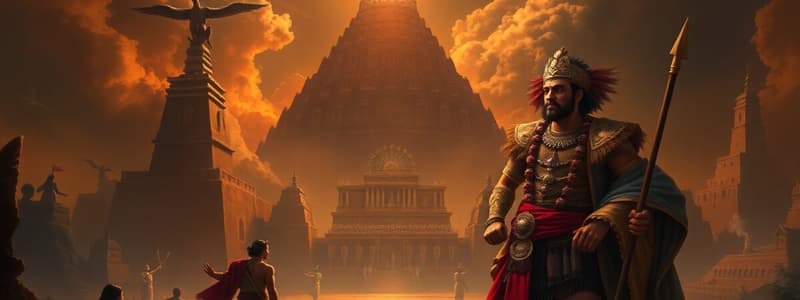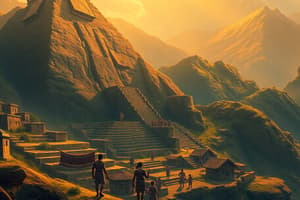Podcast
Questions and Answers
What is a major commonality between the Wounded Knee Massacre and Fidel Castro's rule of Cuba?
What is a major commonality between the Wounded Knee Massacre and Fidel Castro's rule of Cuba?
- Both were marked by political repression and a lack of political freedoms. (correct)
- Both were characterized by the use of forced relocation and cultural assimilation.
- Both involved a struggle against overwhelming U.S. power.
- Both resulted in significant achievements in literacy and health.
Which of the following leaders implemented neoliberal economic policies in their respective countries?
Which of the following leaders implemented neoliberal economic policies in their respective countries?
- Augusto Pinochet (correct)
- Benito Juárez
- Simón Bolívar
- Francisco Pizarro
Which of the following statements accurately describes a commonality between the Inca Empire and the French intervention in Mexico?
Which of the following statements accurately describes a commonality between the Inca Empire and the French intervention in Mexico?
- Both were overthrown by indigenous leaders seeking to reclaim their ancestral lands.
- Both involved the use of advanced military technology that led to their eventual collapse.
- Both were marked by the presence of influential European powers seeking to expand their territories. (correct)
- Both were characterized by advanced agricultural techniques that transformed their respective societies.
Which of the following is NOT a region that was part of the Inca Empire at its peak?
Which of the following is NOT a region that was part of the Inca Empire at its peak?
Despite his significant achievements, what major goal did Simón Bolívar fail to achieve?
Despite his significant achievements, what major goal did Simón Bolívar fail to achieve?
Which leader is known for his resistance to foreign domination and his efforts to modernize Mexico?
Which leader is known for his resistance to foreign domination and his efforts to modernize Mexico?
What is the primary reason for the continued controversy surrounding Augusto Pinochet’s legacy in Chile?
What is the primary reason for the continued controversy surrounding Augusto Pinochet’s legacy in Chile?
Which of the following statements accurately reflects the significance of the Leyes de Reforma implemented by Benito Juárez?
Which of the following statements accurately reflects the significance of the Leyes de Reforma implemented by Benito Juárez?
Which leader is known for his vision of a united Latin America, despite its eventual failure?
Which leader is known for his vision of a united Latin America, despite its eventual failure?
Flashcards
Inca Empire
Inca Empire
A significant pre-Columbian civilization centered in Peru, known for its advanced agriculture and architecture.
Augusto Pinochet
Augusto Pinochet
A Chilean dictator who came to power in 1973 and ruled until 1990, known for human rights abuses.
Simón Bolívar
Simón Bolívar
Venezuelan leader who led independence movements for several South American countries.
Benito Juárez
Benito Juárez
Signup and view all the flashcards
Leyes de Reforma
Leyes de Reforma
Signup and view all the flashcards
Gran Colombia
Gran Colombia
Signup and view all the flashcards
Patagonia
Patagonia
Signup and view all the flashcards
Francisco Pizarro
Francisco Pizarro
Signup and view all the flashcards
Ferdinand Magellan
Ferdinand Magellan
Signup and view all the flashcards
Chavismo
Chavismo
Signup and view all the flashcards
Hugo Chávez
Hugo Chávez
Signup and view all the flashcards
Belize
Belize
Signup and view all the flashcards
Fidel Castro
Fidel Castro
Signup and view all the flashcards
Wounded Knee Massacre
Wounded Knee Massacre
Signup and view all the flashcards
Moby-Dick
Moby-Dick
Signup and view all the flashcards
Battle of the Bulge
Battle of the Bulge
Signup and view all the flashcards
Indian Wars
Indian Wars
Signup and view all the flashcards
Study Notes
Latin American and Caribbean History
-
Inca Empire: A large, sophisticated pre-Columbian civilization in the Andean region (modern Peru, Ecuador, Bolivia, Chile, Argentina, and Colombia). Known for advanced agriculture, roads, and architecture. Fell in 1533 after Spanish conquest.
-
Augusto Pinochet: Chilean military dictator who seized power in 1973. Ruled until 1990, characterized by human rights abuses and neoliberal economic policies.
-
Simón Bolívar: Venezuelan leader in South American independence movements. Sought a unified Latin America (Gran Colombia), but plans were unsuccessful due to regional divisions.
-
Benito Juárez: Mexico's first indigenous president (1858-1872). Implemented reforms (Leyes de Reforma) separating church & state. Resisted foreign invasions, notable the French Intervention.
-
Patagonia: Southern South American region shared by Argentina and Chile. Dramatic landscapes (mountains, glaciers, forests, steppes). Significance in early European exploration (Magellan's Strait). Natural resources include oil, gas, and minerals.
-
Hugo Chávez: Venezuelan president (1999-2013). Implemented socialist reforms (Chavismo)—nationalization, social welfare, use of oil wealth. Critical of U.S. foreign policy. Economic policies initially improved social indicators, but eventually led to economic challenges and hyperinflation.
-
Belize: Central American country, official language is English, formerly British Honduras. Gained independence in 1981. Known for biodiversity (Great Blue Hole), Mayan ruins, and Afro-Caribbean culture.
-
Fidel Castro: Cuban revolutionary leader (1959-2008). Established a communist state. Emphasized state-run healthcare, education, industry. Achieved significant literacy and health advancements, but regime also faced political repression and economic challenges.
US History
-
The Wounded Knee Massacre: December 29, 1890. U.S. Army killed Lakota Sioux near Wounded Knee Creek, South Dakota. Marked the end of Indian resistance and the devastating impact of westward expansion.
-
Herman Melville and Moby-Dick: 1851 novel by Melville based on his whaling experiences. Explores obsession, revenge, and humanity's struggle against nature. Captain Ahab's pursuit of Moby Dick symbolizes unchecked ambition.
-
The Battle of the Bulge: (December 16, 1944 – January 25, 1945). Final German offensive in World War II. Took place in the Ardennes region of Belgium, attempting to break Allied lines. A large, bloody battle. German offensive ultimately failed due to logistical problems, winter conditions and resilience of Allied forces. Signaled the beginning of the end for Nazi Germany.
Studying That Suits You
Use AI to generate personalized quizzes and flashcards to suit your learning preferences.




